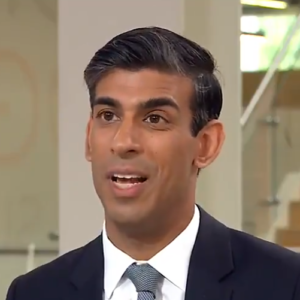Rishi Sunak’s spring financial statement this lunchtime saw the Chancellor scrapping VAT on home solar, heat pumps and energy efficiency materials for five years, in a series of pro-green moves certain to be welcomed by installers and manufacturers. But the Conservative Chancellor had no relief from rising power prices to offer companies, particularly in energy-intensive manufacturing.
For the archetypal ‘average’ home now installing solar PV, Sunak claimed his removal of VAT and other measures would save around £1,000, given the steeply rising costs of purchased power.
At commercial scale, wind- and water turbines will also benefit from an identical zero-VAT rating, the Chancellor announced.
On solar PV and energy decarbonisation for commercial buildings, the Chancellor bowed finally to a long-standing demand from trade body Solar Energy UK, property owners and others.
Next month, business rates will be lifted on a range of green technology used to decarbonise buildings, including solar PV and batteries. Eligible heat networks will also receive 100% relief. Together these will save businesses more than £200 million over the next five years, according to Treasury analysis.
Chris Hewett, Solar Energy UK’s chief executive was glad. “Solar Energy UK is delighted to see VAT reduced on solar and other energy saving materials for residential use, after many years of calling for this.
“It is common sense for the Treasury to be encouraging greater uptake of all zero carbon technologies in the face of an energy security crisis and climate emergency. It will be seen as a real endorsement of solar, as well as improving the pay back for many consumers who may be on the fence.”
Chancellor Sunak was speaking at lunchtime against the background of a loosening price cap which will send all energy rocketing in price next month, lifting by 54% the same archetypal ‘average’ even under the domestic-focused tariff cap, to around £1,971 per home. October looks set to repeat the wave of eye-watering tariff hikes.
The Chancellor faced heavy criticism from his Labour shadow Rachel Reeves, as he rejected a one-off windfall tax on oil and gas retailers, as adopted in Spain, France and elsewhere.
“We want to encourage investment in the North Sea, and we need to rely more on domestic energy”, the Chancellor told Reeves in the Commons. He promised that the government would deliver its long-awaited paper on Britain’s energy security ‘in coming weeks’.
Income tax for basic rate earners will fall too by 1%, to 19%, a saving, said the Chancellor of £5 Billion to 30 million taxpayers.
Helping motorists, the Chancellor cut fuel duty by 5 pence per litre for twelve months, effective from 6pm tonight, in what he hailed as the biggest ever cut in the tax.
Energy matters related to the global cost of living crisis led the Chancellor’s spring statement. The government was directing £ 9 billion of help towards 28 million households, he claimed.
£500 million of that will go into doubling to £ 1 billion funds available for councils to distribute to fuel-needy homes, under the Household Support Fund, launched last April.
The Chancellor claimed as a Brexit benefit the zero-rating of home insulation measures and on-roof solar. He said a 2019 ruling by the European Court of Justice had previously stopped Britain while an EU member from making home solar and energy efficiency eligible for VAT exemption.
Against rising inflation, the costs of borrowing will continue to rise, Sunak told the Commons. Covid-combatting measures and related support by the government for business meant that interest payments alone on government debt will this year be a record £ 83 billion, four times their level only a year ago.
But with UK unemployment at 3.9% recovering low levels last seen before the pandemic, Sunak hailed today’s package as an example of helping taxpayers with the cost of living, accelerating growth and sharing the proceeds of recovery fairly.
nPower Business Solutions: ‘We hoped for more support for firms’
Anthony Ainsworth, chief operating officer at supplier nPower Business Solutions, said he welcomed the VAT exemptions, but had hoped for more to support businesses, particularly in energy-intensive sectors.
“It is vital that (the forthcoming Energy Security Strategy) supports businesses to help them invest in measures to become more energy-resilient and energy-efficient to help counter the rise in prices caused by the highly volatile wholesale markets”, he added.
Ainsworth went on: “We had also hoped to see confirmation that the super-deduction tax incentive introduced for plant and machinery in the March 2021 Budget could be made permanent for any green-related technologies”. He understood that consultations were continuing.
BP the ‘cash machine’: Labour
In the Commons, Labour’s Reeves was scathing about Sunak’s ducking out of a windfall levy on hydrocarbon firms. With oil companies posting such high returns that they didn’t know how to spend the proceeds, the shadow Chancellor accused Sunak of defending record profits.
“BP describes itself now as a cash machine, but it is the British people who are having to pay out”, Reeves jibed at Sunak.
Estimates of the likely revenue from such a one-off levy had risen from £1.4 billion last year to over £ 3 billion now, Labour’s spokesperson added, enough to cut VAT, and to pay for a Warm Homes Discount of £600 per home.
With home finance experts such as Martin Lewis warning as many as ten million would be in fuel poverty by this winter, Reeves told Sunak it was disgraceful he had not been able to put a number to the fuel poor, during interviews he gave over the weekend.
Reeves branded as “appalling” Sunak’s failure this morning to announce any cost relief targeted at high-energy manufacturing. His energy efficiency promotions were “wholly inadequate”, she opined.
She attacked Conservative cronyism and fraud relating to purchase of pandemic-related PPE for health care staff. Sunak had left open the doors to a ‘frenzy of fraud’, in Reeves’ words, with £11.8 billion of public money being stolen, wasted or defrauded. The Chancellor had signed cheques for £3.5 billion worth of PPE contracts awarded to Conservative insiders. Seven billion items of PPE had been found to be unusable and was fit only for burning, Reeves said.




